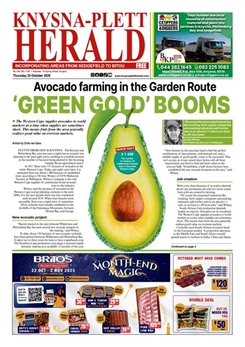KNYSNA NEWS - Seems like masks are back in. After weeks of global toing and froing about whether mask-wearing in public should be compulsory or not, masks seem to be winning the tussle. But with certain conditions.
The most notable one being that members of the public wear homemade masks and not public protection equipment (PPE) or surgical masks so that the medical fraternity don't experience a shortage.
Up until now, medical and governmental authorities have resorted to what many believe to be misleading statements (such as that wearing masks could put you at an even higher risk than not wearing them), in an attempt to curb the purchase of professional masks which are in short supply globally.
The global scramble for protective gear has even prompted the French to coin the term "guerre des masques" – the war of the masks – after French officials alleged their consignments from China have been hijacked by Americans according to a CNN report last Friday.
Even the WHO is on it now
But convincing arguments for homemade masks have been slowly gaining ground with the World Health Organisation (WHO) – which has dragged its feet more than any other health organisation on the issue – this week reluctantly conceding that it could be well, sort of helpful in some cases: In places that decide to encourage community members to wear masks, "they must be used safely and properly," WHO director general Tedros Gebreyesus told Business Insider. He encouraged countries that have taken that step to study their effectiveness and share the results.
Long since accepted as normal in eastern countries, many whose citizens habitually don masks in public during any regular flu season, the threat of Covid-19 has eclipsed the stigma of mask-wearing in several western nations such as Italy (finally!) Austria and the Czech Republic where governments have instructed everyone to cover their face outside the home.
Uri Freidman of The Atlantic in a piece titled "Face masks are in'' last week quoted Christos Lynteris, a medical anthropologist at the University of St Andrews, in Scotland: "Whether the masks actually work or not, having a community wear them brings it together symbolically, visually against this disease," which is particularly vital during periods of social distancing and isolation, Lynteris said.
In recent days, an assortment of scientists, health experts, pundits and influencers has vigorously advanced their position that everyone venturing into public or crowded places should wear a mask or face shield — even a homemade one — to lower the rate of transmission of the coronavirus, a report in the Washington Post stated on 31 March. It cited an interview with Thomas Inglesby, director of the Johns Hopkins Center for Health Security, wherein he said the CDC should urge people to use non-medical masks or face coverings."I think it would be a prudent step we can all take to reduce transmission" by people who are infected but have no symptoms, he said.
Reminder of the crisis
Said Harold Varmus, former director of the US National Institutes of Health and the National Cancer Institute: "Mask-wearing also serves as a reminder to all that we are in a crisis situation and are trying to be good citizens by covering our mouths."
Although in Knysna it is still only a recommendation (see municipal and provincial stance on this here), the general global consensus and common wisdom thus seem to be shifting in favour of compulsory homemade mask-wearing for everyone in public. Not only because it helps to curb the spread of the virus in asymptomatic and pre-symptomatic people and offers at least some preventative help (10% safety from droplets is better than none) – but because it constitutes a blatant show of social solidarity. If everyone wears a mask like a new uniform it symbolically says we're all in this together. I care about you and you care about me.
It sufficiently supports the every-little-bit-helps notion too. "The argument … about everybody wearing a mask is not that it will prevent everyone from getting infected – it's that it will slow down transmission in the community a bit," Ben Cowling, a professor of epidemiology and a mask researcher at the University of Hong Kong's School of Public Health, previously told Business Insider. "That's already useful. Just to have even a small effect is useful."
Dear reader, As your local news provider, we have the duty of keeping you factually informed on Covid-19 developments. As you may have noticed, mis- and disinformation (also known as “fake news”) is circulating online. Group Editors (publications and online platforms) is determined to filter through the masses of information doing the rounds and to separate truth from untruth in order to keep you adequately informed. Local newsrooms follow a strict pre-publication fact-checking protocol. A national task team has been established to assist in bringing you credible news reports on Covid-19.
'We bring you the latest Knysna, Garden Route news'
















